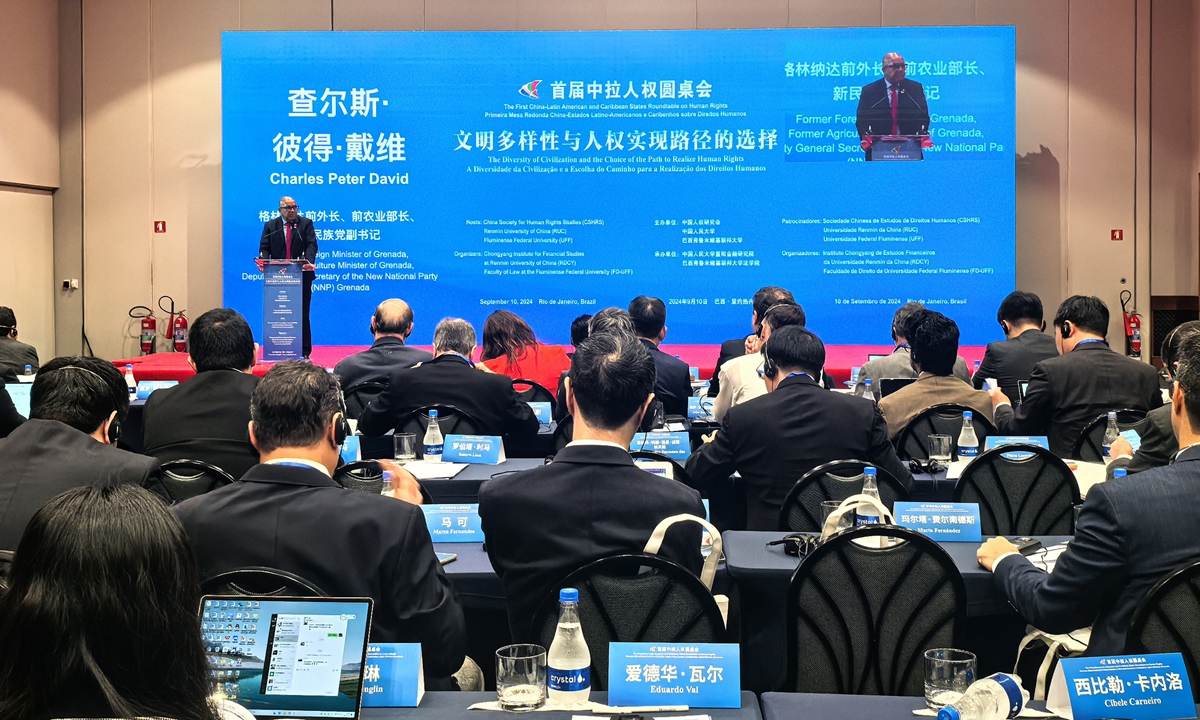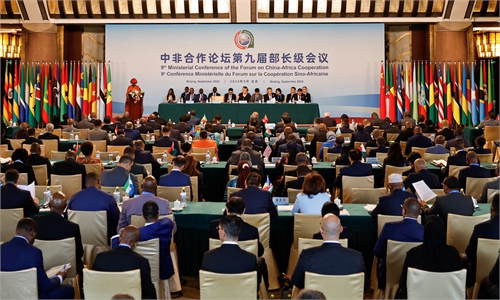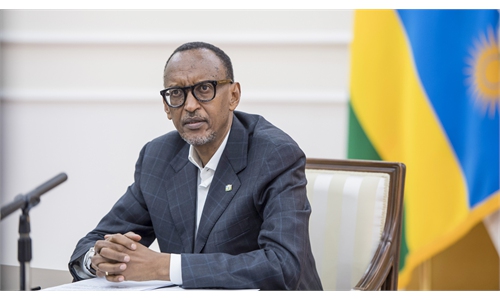First China-LAC roundtable on human rights held in Brazil, hailed as cooperation model for Global South

Photo: Cao Siqi/GT
Against the backdrop of hegemonism, power politics, regional conflicts, economic slowdown and climate change, which are posing significant threats to the protection of human rights in today's world, the First China-Latin America and Caribbean (LAC) States Roundtable on Human Rights convened in Rio de Janeiro, Brazil, on Tuesday local time.The event constituted a platform for more than 120 senior officials, scholars, experts and representatives from social organizations and think tanks from 17 countries to discuss paths to achieving human rights.
The roundtable, held at a time when the year 2024 marks the 10th anniversary when Chinese President Xi Jinping proposed building a community with a shared future between China and Latin America and the Caribbean, as well as the 50th anniversary of diplomatic relations between China and Brazil, highlighted the growing cooperation between China and LAC countries on human rights development. Experts and scholars attending the event told the Global Times that this cooperation serves as a model for South-South cooperation and reflects the increasing recognition and resonance of Xi Jinping Thought on Diplomacy in LAC countries.
Reframing path to realizing human rights
This roundtable, co-hosted by the China Society for Human Rights Studies, Renmin University of China, and Fluminense Federal University in Brazil, marked the first mechanism-based exchanges and discussion on human rights between China and LAC. Chinese and international participants expounded their insights on the contributions of China and LAC to global human rights civilization, as well as the challenges and solutions facing global human rights governance.
Shu Hongshui, dean of School of National Security and research fellow of Human Rights Research Center at Northwest University of Political Science and Law in Xi'an, Shaanxi Province, shared the practice of ensuring the rule of law in counter-terrorism and de-radicalization in China's Xinjiang region and its contribution to global security.
"In the legal safeguards for efforts in combating terrorism in the Xinjiang region, China fully demonstrates its commitment to a human rights development path that emphasizes the rule of law and prioritizes people's rights to development," Shu told the Global Times. "This provides Chinese wisdom for global human rights governance."
However, the US and its allies have repeatedly intervened in the internal affairs of other countries under the guise of "democracy," "freedom," and especially "human rights." They have even vigorously instigated "color revolutions" aimed at overthrowing governments to further Western political agendas. Countries that have experienced "color revolutions" have been forced to imitate and apply economic development and political models that do not align with their own national realities, resulting in hindered economic growth and damage to the interests of the majority of the populace. Far from bringing stability or improving livelihoods, these "revolutions" have deepened political strife, triggered humanitarian crises, and set back the development of human rights, Shu noted.
The cooperation between China and LAC in the field of human rights demonstrates that promoting and protecting human rights is a global effort requiring collective participation. There is no "perfect model" for human rights issues, nor is there a need for a "teacher" to dictate terms to other countries, Shu emphasized.
Echoing Shu, Fernando Estenssoro, doctor en Estudios Americanos, Universidad de Santiago de Chile, shared his thoughts on how human rights have been used as a tool of controlling and domination by the US and its allies.
"The US has used its hegemonic role in the international system from 1945 onward to hide its political and geopolitical interests of global power under the cloak of protecting human rights. It is worth recalling its colonialist and imperialist policy in Vietnam, the economic siege of Cuba, or the overthrow of Salvador Allende, among many other historical examples, up to its current behavior in the face of the genocide that its close ally, the State of Israel, is carrying out against the Palestinian people, to demonstrate this assertion," Fernando Estenssoro said.
Evandro Menezes de Carvalho, law professor at Fluminense Federal University and head of the Brazil-China Research Group at Getulio Vargas Foundation School of Law, told the Global Times that "we must strongly combat the political use of 'human rights' as a shield to justify interventions in other countries, which paradoxically leave a trail of destruction wherever they go."
The time for Western hypocrisy is over. China-Latin America cooperation offers the possibility of reframing the path of human rights by prioritizing socioeconomic development and peace as the dimensions upon which joint actions should be built. Human rights inspire our commitment to dialogue that unites us, rather than divides us, he said.
More balanced, inclusive global order
At the closing ceremony, a research report was jointly released by China Society for Human Rights Studies, Chongyang Institute for Financial Studies at Renmin University of China and Faculty of Law at the Fluminense Federal University, depicting in a comprehensive way the China-LAC cooperation on human rights development, the present and the future.
China-LAC cooperation on human rights development is grounded in their existing collaboration across various sectors. In recent years, both have played key roles in shaping international human rights agendas, advocating a fairer, more equitable, reasonable, and inclusive approach. They have been opposing the use of human rights as a tool for unilateralism and hegemonic actions while supporting the impartial and objective functioning of the UN human rights organizations, the report said.
The report highlighted the China-LAC cooperation as a model of the Global South countries, which demonstrates the potential of South-South cooperation. The partnership covering fields such as economy, trade, ecological environment and public health has not only created more development opportunities for respective countries, but also provided useful experience and inspiration for other developing countries, Zhu Xiaohui, associate professor of National Base for Human Rights Education and Training at Fudan University, told the Global Times on the sidelines of the event.
Echoing Zhu, Ronnie Lins, director of the China-Brazil Center for Research and Business, told the Global Times that this cooperation strengthens the idea that developing countries can create their own path to progress without relying on Western models, and it can contribute to a more balanced and inclusive global order.




